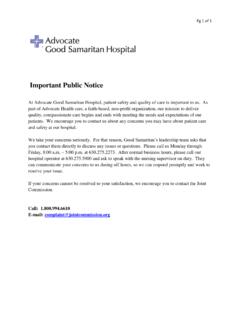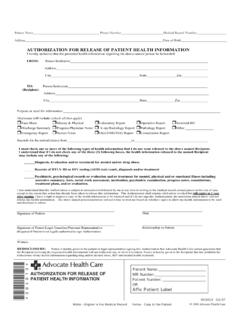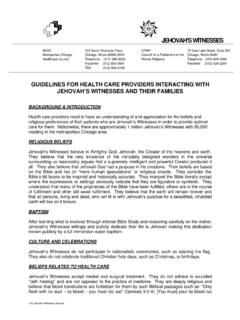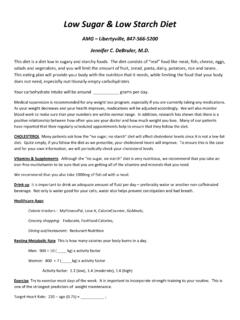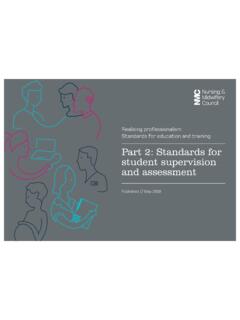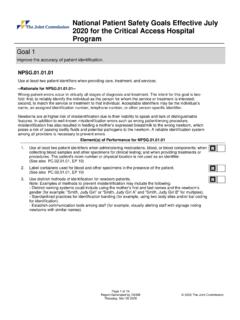Transcription of Meditech Patient Care System Clinical Documentation ...
1 1 Meditech Patient care System Clinical Documentation Nursing Student Pre Training Overview Instructions: Read and familiarize yourself with the contents of this module. Upon completion, print the Clin Doc Training Pre-test also available on this site. Bring the completed quiz to your scheduled computer training class at Advocate BroMenn Medical Center. It will serve as your entry ticket for class. 2 Section 1 Introduction Overview: This module includes a brief introduction to the Meditech Patient care System (PCS), a review of general Meditech functionality, including general navigation principles and key definitions.
2 Audience: This document is intended for nursing students performing Clinical rotations at ABMC. Key definitions/functionality within PCS: Auto referral: Meditech can initiate an order or referral based on the answers to an assessment. Example: if the Patient requests additional information about Advance Directives and the nurse answers "yes" to the question, Meditech sends a referral to Spiritual care to request a Patient visit. Demo recall/recall values: The ability to 'pull forward' responses from a previous visit or from a previous assessment.
3 This information must be reviewed to ensure that it is still accurate. Recall reduces the amount of data entry and time needed to complete the assessment, since the care provider is validating and performing data entry only to make changes to the data. Auto calculation: The System can calculate values automatically, saving time and eliminating errors. For example, Meditech calculates the Fall Risk Score based on the nurses' assessment. Status Board: A Patient list that provides an overview of Patient information ( Room/Bed, physicians, allergies, chief complaint, diet, medications due, interventions due, etc.)
4 Worklist: A Patient -specific list of interventions and assessments. When interventions/assessments are assigned a frequency, Meditech will provide a reminder of due and past due items. Assessment and intervention Documentation is accessed through the worklist. Standards of care : Sets of interventions/assessments that are defined for specific Patient populations ( Unit specific minimum care standards, standards specific to Patient condition such as Fall Prevention, PICC/Midline catheters, etc.)
5 Protocols: Resource documents accessible within PCS, associated with interventions/assessments that provide the care provider with additional information or guidance. Protocols are for reference only and do not become part of the Patient 's medical record. 3 Section 2 - Policies and Procedures/Expectations Advocate BroMenn Medical Center's information technology users need to be familiar with and accountable for compliance with all policies and procedures relating to the use of information systems, access and use of Patient data, and access and use of organizational data.
6 However, there are key areas which we wish to reinforce and focus on during Information Systems Training. Those areas relate to Security, Confidentiality, Logons/Passwords, access and Competencies. Security: All users of information systems are responsible for the security of data. This includes making sure that computer screens are not viewable by the public or by others who do not have a need to see the data being displayed. Users are responsible to ensure that they log off of systems appropriately to make sure that the systems are not open to unauthorized access .
7 Physical security of data also applies to any other media such as paper reports, data on disks/CDs, etc. This data must also be secured and disposed of properly to prevent access by others. Confidentiality: Users are only authorized to access information on patients in whose care they are involved and only that data required to perform their job function. System audit trails allow for the reporting of document access . These audit trails will be systematically reviewed to monitor compliance with our policy.
8 Information should only be shared with others involved in the Patient s care and only the information that is need to know . Staff should be cognizant of the environment in which the data is shared to prevent inadvertent disclosure ( be sure that others can not overhear or see the information). Passwords/logons: Passwords/logons are assigned to an individual. They belong only to that individual. You should not share your password/logon with anyone else. You should never use another s password/logon.
9 Be sure that prior users are logged off the System before using the System and make sure that all work is done under your own log on. Remember the audit trail and that you are accountable for all activities under your access . In the event that you forget your password, your identity will be verified per policy and then you will be issued a temporary password. You will access the System using your temporary password and then enter a new password on prompting (known ONLY by you). Passwords will change every 60 days.
10 Passwords must be at least 7 characters, should be alphanumeric mix, and should not be easily guessed combinations ( children s names, anniversary, etc.). It is the intent that Documentation will be real time and performed at the point of care whenever possible. Data entered is available within the Electronic Medical Record (EMR) for review. 4 Section 3 The 'Rights' of Clinical Documentation Online Clinical Documentation is utilized by the physician and the care team to make decisions regarding Patient care .
